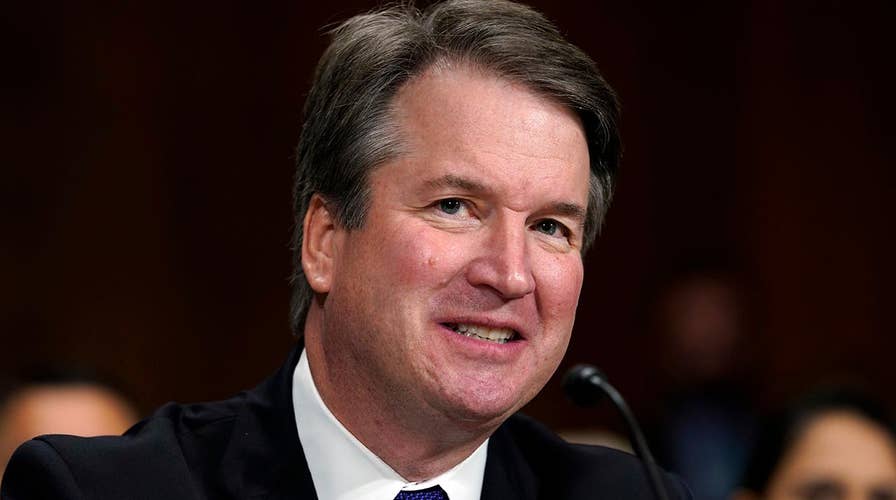Senators take turns reviewing FBI Kavanaugh report
McConnell files motion to end debate on Kavanaugh and start process for confirmation vote. Kirstin Fisher reports from Capitol Hill.
Unless some blockbuster revelation based on corroborated and convincing evidence comes out of the reopened FBI background investigation of Judge Brett Kavanaugh that was completed Wednesday, there is insufficient evidence for the Senate to refuse to seat him on the Supreme Court.
Professor Christine Blasey Ford – who told the Senate Judiciary Committee last week that Kavanaugh sexually assaulted her some 36 years ago when both were in high school – was a compelling and sympathetic witness. But so was Kavanaugh, whose good name has been dragged through the mud by Democrats willing to say just about anything to keep him off the high court.
Let’s be clear about one thing: we can all agree that sexual assault is a serious crime and must be punished. But that doesn’t mean every allegation of sexual assault must automatically be believed without supporting evidence.
Refusing to accept as accurate an accusation of sexual assault that is not supported by other evidence does not mean our legal system doesn’t consider sexual assault a terrible crime. We require evidence in addition to an accusation to prove all crimes.
But the Democratic members of the Senate Judiciary Committee who questioned Kavanaugh last week stated repeatedly that his confirmation hearing was not a legal proceeding. They said it was a job interview.
Because of this, the Democrats suggested that the burden should be on Kavanaugh to prove that he did not try unsuccessfully to take off Ford’s clothes at a party while he was drunk, and did not cover her mouth with his hand to stop her from screaming, as she testified.
However, the Democrats are incorrect. Kavanaugh’s Senate confirmation hearing was much more than a job interview. In fact, the Democrats themselves seemed to acknowledge this by their actions, if not their words, by demanding an investigation by the FBI in addition to the committee’s own investigation.
In reality, the confirmation hearing amounted to a public trial of Kavanaugh’s reputation that was viewed by millions of people around the world. When was the last time you had a job interview like that?
In our system of law, accusations must be proved by those making them. We do not require the accusations to be disproved by the accused.
There are many good reasons for this, not the least of which is that justice demands an individual be presumed innocent until proven guilty. Unsupported allegations are insufficient proof of guilt.
There is no corroborating evidence to support Ford’s allegation that Kavanaugh sexually assaulted her. There is corroborating evidence that she has believed for some time that she was attacked – namely the statements she made to her therapist and to her husband.
And there is no corroborating evidence that the party where Ford claimed she was attacked actually occurred. Others who were supposedly at the party say they can’t remember any such gathering.
In addition, the timing of Ford’s allegations to the Judiciary Committee seriously undermined their credibility. The problem is not that Ford waited 36 years to reveal her allegations against Kavanaugh publicly. Rather, the problem is that she waited until public discussion of the possible nomination of Kavanaugh to the Supreme Court had begun before coming forward with her allegations.
Moreover, the conduct of Sen. Diane Feinstein, D-Calif., who refused to reveal these allegations after Ford contacted her in July, smacks of partisan politics at its worst. Clearly, Feinstein was not motivated by a desire to determine the truth of the allegations, but by a desire to cause maximum delay in the confirmation process in hopes of receiving a political advantage.
Finally, certain conduct by Ford calls her credibility into question. Specifically, her refusal to meet with the committee prior to last week’s hearing seems to suggest she may have a motive beyond simply civic duty and telling her story to seek justice.
As one excuse for refusing to come to Washington to meet confidentially with the committee Ford stated that she had a fear of flying. The information revealed last week indicated that she has a fear of flying only when she finds the trip to be inconvenient or undesirable.
Not only did Ford refuse to meet with the committee in Washington – she also refused to meet with the committee in her home state of California. The committee had offered to go to there to accommodate Ford’s supposed fear of flying.
Instead, Ford hired a lawyer recommended by Feinstein to help her prepare for a hearing that had not even been scheduled at the time. All of this seems to suggest that Ford could have a political motivation in addition to civic duty and receiving justice that motivated her to level accusations against Kavanaugh.
As of now, there is insufficient corroborating evidence that has been publicly revealed to support Ford’s allegations and as a result Judge Kavanaugh should be treated as innocent of these allegations. Unless the findings of the FBI investigation change that, the Senate should confirm him promptly.
George A. Nation III is a professor of law and business at Lehigh University.









































